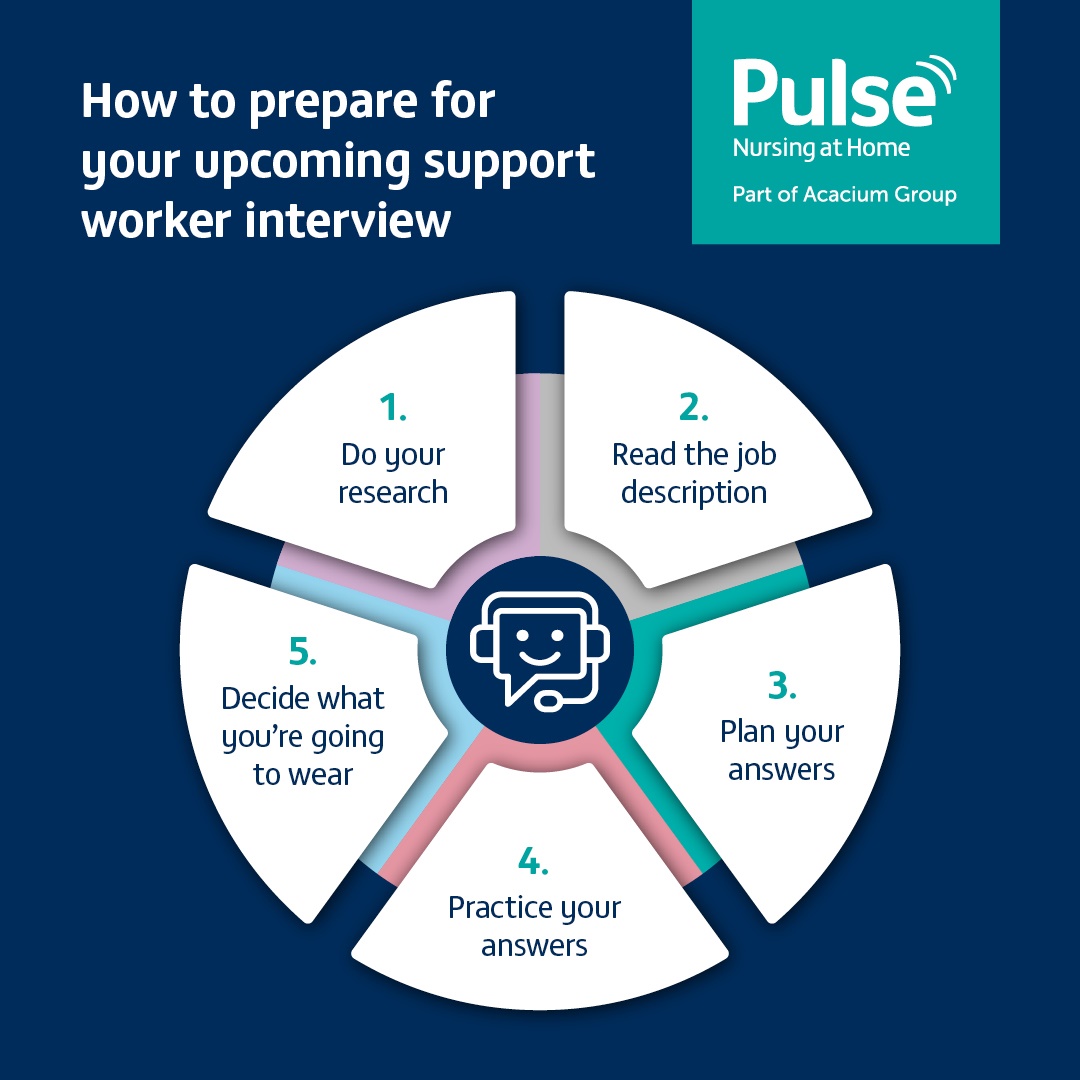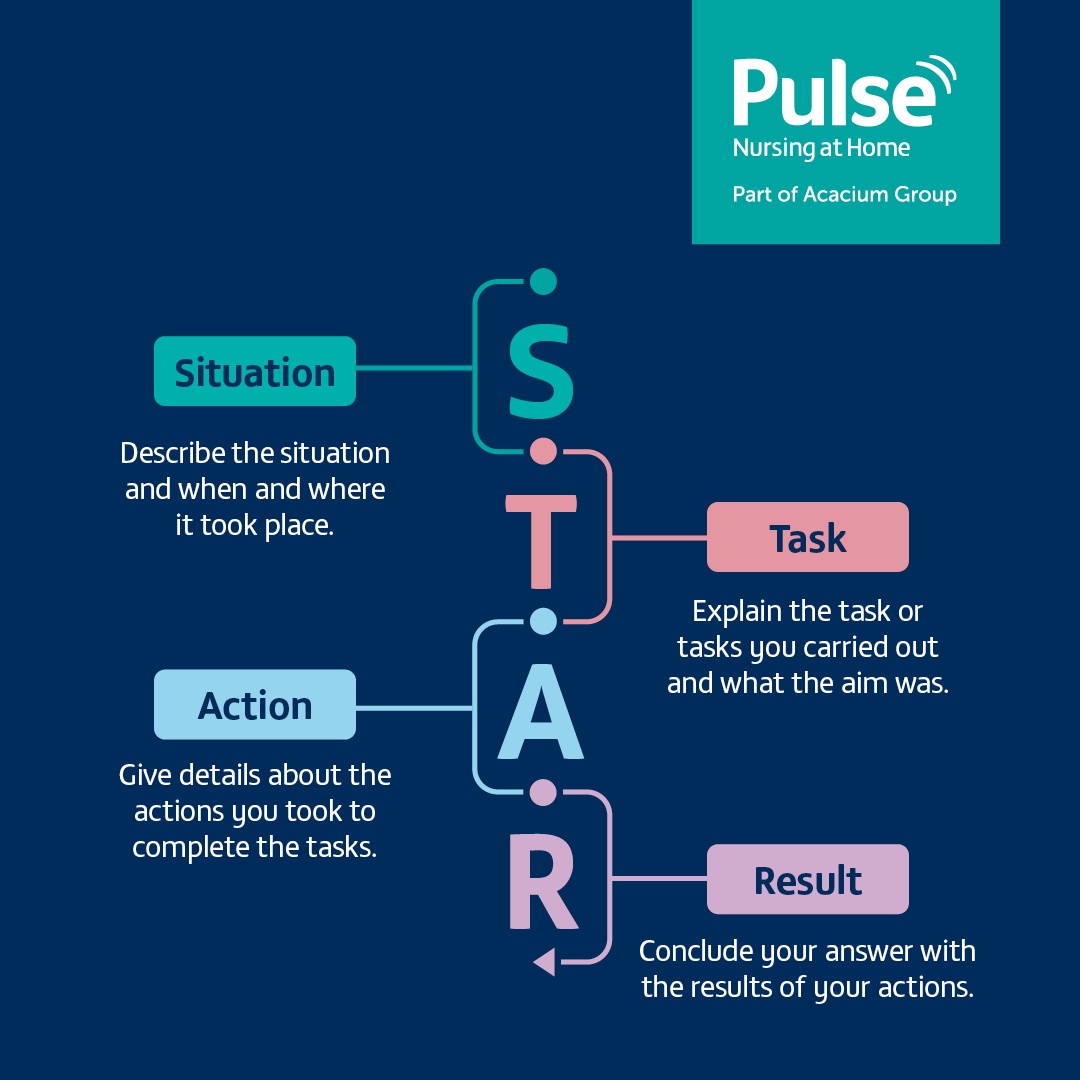5 common support worker interview questions and how to answer them

- This post was updated on 31st March 2025
We have created this comprehensive guide to help you prepare for your upcoming support worker interview.
From the five most common interview questions to expect, advice on how to answer them, guidance on preparing for your interview, and tips on what to do during your interview, our guide covers all the information you need.
Select from the below areas to navigate around our support worker interview guide.
5 most common support worker interview questions and answers
There are several common questions to expect in your upcoming interview. The following questions help the interviewer gain a good understanding of your experience, your skills, your personality and how you handle different situations.
1. What attracted you to the support worker role?
This question can help the interviewer determine what attracted you to the role, if you're the right fit for the job, and whether you have researched the company you’re interviewing with.
Preparation tips for question 1
When preparing your answer for this interview question, review the job description to identify the key elements of the role and information that attracted you to the company.
If this role is based in a different care setting than your previous support worker job, research the key differences and expectations in the care setting so you fully understand how it differs and know what to expect.
Guidance on how to answer question 1
To provide a thorough response to this interview question, try to mention the following areas in your answer:
- Key skills and qualities that you can bring to the role
- What attracted you to the company
- How your previous experience will translate into the role
- A key highlight from your last job that has made you a great support worker
2. What skills and qualities can you bring to the role?
Skills and qualities-based interview questions are often asked to give the potential employer a good understanding of your work ethic, professionalism and personality type.
It’s important to practice for this question and craft a strong answer that highlights the key skills and qualities you can bring to the support worker role.
Preparation tips for question 2
Employers look for a range of skills and qualities when recruiting support workers. It's important to know what they are and how to include them in your answer. For more information on what skills and qualities support workers should possess, read our blog about the 6 important skills and qualities of a good support worker.
Guidance on how to answer question 2
This interview question provides a great opportunity to highlight your skills and qualities that are relevant to the support worker role. To help you form a detailed and engaging response, use the STAR interview method.
To learn more about using this technique, take a look at the ‘STAR interview technique’ segment further down in our blog.
3. What do you consider to be your strengths and weaknesses?
When the interviewer asks this question, they will look for your core qualities in your answer. These could include a passion for caring for people, good communication skills, and staying calm in challenging situations.
Preparation tips for question 3
These type of questions can be quite generic, so to help you give a more relevant answer, spend some time writing down your strengths and weaknesses. Then, follow that by conducting some research before the interview to learn the company's values and visions and try to weave them into your answers.
Guidance on how to answer question 3
The key focus for this question is honesty and self-awareness. The employer will look at how you talk about your strengths and weaknesses and how you manage them. They will see how ambitious you are to improve yourself further so that you continue to grow and develop throughout your support worker career.
4. Can you provide an example of when you faced a challenge and how you managed it?
During your support worker career, you will have faced numerous challenges that required you to de-escalate or manage them. An interviewer will ask this question to understand your ability to manage challenging situations and overcome them in the most professional way that considers the safety and wellbeing of your colleagues, the client and yourself.
Preparation tips for question 4
These types of questions often come up in interviews, so it's important to have an answer prepared. Spend some time reflecting on your support worker career and note at least three examples of challenging situations, how you managed each of them and the positive outcomes that followed.
Guidance on how to answer question 4
When answering this interview question, explain the challenge in a positive light and focus on the outcomes of your successful management of the challenge and how it impacted each person involved.
5. What experience have you gained from your support worker career?
This question helps the interviewer understand your support worker background, the type of jobs you previously held, and what you learned from each role.
Preparation tips for question 5
To help you prepare for this question, take a moment to review your CV and the different roles you have worked throughout your career. This allows you to identify the experience and expertise you have gained during your support worker jobs.
Guidance on how to answer question 5
During your answer, take the opportunity to share some key highlights from your career and briefly explain the positive impact they’ve had and how you will use those positive experiences in your new role if you are successful in your interview.
Most common types of interview questions for support workers
During an interview, you will be asked a range of questions about your experience, knowledge, characteristics, and skills. Knowing what to expect ahead of your interview can be a challenge, but there are four key types of interview questions to expect.
To help you prepare for your upcoming interview, we have outlined the most common types of interview questions below.
1. Skills-based interview questions
Questions focused on your skills help the interviewer determine your current support worker skill set, what skills you could bring to the role, and opportunities for further development.
2. Personality-based interview questions
Interview questions relating to your personality are often asked to determine your characteristics and personal values. They are asked in interviews to give the potential employer an idea as to whether you would be a good fit for the company and the team you would be joining.
3. Situational interview questions
Situational-style questions give the interviewer a good understanding of how you would react, approach, and manage different workplace situations in your support worker job. Some questions may focus on difficult and challenging situations with clients or even colleagues.
4. Strengths and weaknesses interview questions
Potential employers ask questions focused on your strengths and weaknesses to learn more about you and determine how self-aware, open, and honest you are. These questions allow you to reflect and share moments from your career and discuss opportunities for growth.
How to prepare for your support worker interview
Preparation is key to a successful support worker interview. Spending time preparing and planning your answers can help you feel confident and ready for the day.
Here are the key steps to take ahead of your support worker interview.

Read the below tips for more guidance and advice on preparing for your upcoming support worker interview.
1. Do your research
Research is a vital part of the preparation for your interview. To learn more about your potential employer, look at their website, especially the ‘About us’ pages, company history and their visions and values. Also, spend some time looking at their social media accounts to find out about their company culture.
2. Read the job description
Ahead of your upcoming interview, spend time reading the job description of the role you’ve applied for. This will give you a good indication of the support worker role and responsibilities you will carry out and how your experience aligns to the role.
3. Plan your answers
After conducting your research, you can begin to plan your answers to the five common support worker interview questions above. Start by noting what you would like to say and any examples to include in your answers to showcase you are the ideal candidate for support worker job.
4. Practice your answers
After planning your answers, practice on your own or with a friend or family member. Sometimes, getting someone to read out the questions can help you create an interview-style environment and help you feel prepared.
In some circumstances, your interview may be online and the company may give you the option to try a practice online interview ahead of your real one.
At Pulse Nursing at Home, we use HireVue, an online interviewing platform, to conduct our online interviews at any time or day that works for you.
HireVue offers a practice online interview ahead of your real one to ensure you feel prepared and comfortable using the platform and understand how to navigate around it. It also gives you an initial idea of the questions that may be asked in the actual support worker interview.
5. Decide what you’re going to wear
Whether your interview is virtual or in person, it’s important to dress smartly and look professional. Choose an outfit that is presentable but also comfortable to wear. How you dress for an interview gives the potential employer a good impression of you.
How to introduce yourself in a support worker interview
Introducing yourself in your interview is an important moment to give a great first impression. It will set the scene and give the interviewer a good idea of the type of support worker you are. A few things to remember are to greet the interviewer professionally and maintain eye contact to show you are engaged.
Keep your self-introduction short, professional and friendly and don’t forget to smile. Sometimes, it’s the little things that make a big difference.
Tips on what to do during your interview
Now we’ve gone through the most common support worker interview questions and how to answer them. The next step is knowing what to do during your support worker interview.
When answering questions in the interview, you need to speak confidently and clearly at a reasonable pace to show you are engaged. Focus on listening to the questions carefully and then take your time when giving your answer so you can provide a detailed response.
If the interviewer asks you a question you don’t fully understand, don’t be afraid to ask them to rephrase the question or explain it in more detail. This will help to give you more clarity and hopefully a good idea of the answer the interviewer is looking for.
If the opportunity arises when answering experience-focused questions, give examples from your support worker career to show how your previous experience could be utilised in the job you’re interviewing for.
Here are our top 5 tips on what to do during your support worker interview.
1. Utilise the STAR interview method to help form your answers
The STAR interview technique is a useful method to try when answering support worker interview questions. It ensures that you give the best possible answers and showcases your extensive skills and knowledge.
The STAR method is an interview technique that gives you a structured format to tell a story by laying out the following:
- Situation
- Task
- Action
- Result

2. Take regular pauses
Taking a short pause every now and then can help you project confidence and give you the opportunity to think about how you’re going to answer the question and any key points you would like to cover in your answer.
3. Be confident and professional
Confidence is key. Showing the interviewer that you are confident demonstrates that you believe in yourself and your skills as a support worker. Confidence can help you stand out and feel calmer during your interview.
4. Maintain positive throughout your interview
Positivity and optimism show a potential employer that you have a can-do attitude. Positivity can affect those around you, leading to a successful support worker interview.
5. Be mindful of your body language
Your body language can tell the interviewer a lot about you, how you feel during the support worker interview and how professional you are. Spend time in front of a mirror practising different positions and facial expressions. This will give you a good indication of how to position your body during your interview.
6. Maintain eye contact
Maintaining eye contact can show the interviewer that you’re engaged and actively listening to them. It can also build trust and demonstrate professionalism and confidence.
Support worker jobs and opportunities with Pulse Nursing at Home
If you’re looking for your next support worker job and want to be a community-based support worker providing clinically outstanding care to individuals in their own homes, then view our latest support worker jobs.
If you’d like to register your interest or speak with our team, contact them using the details provided or complete our short form.
Phone: 0333 323 3746
Email: joinus@pulsenursingathome.co.uk